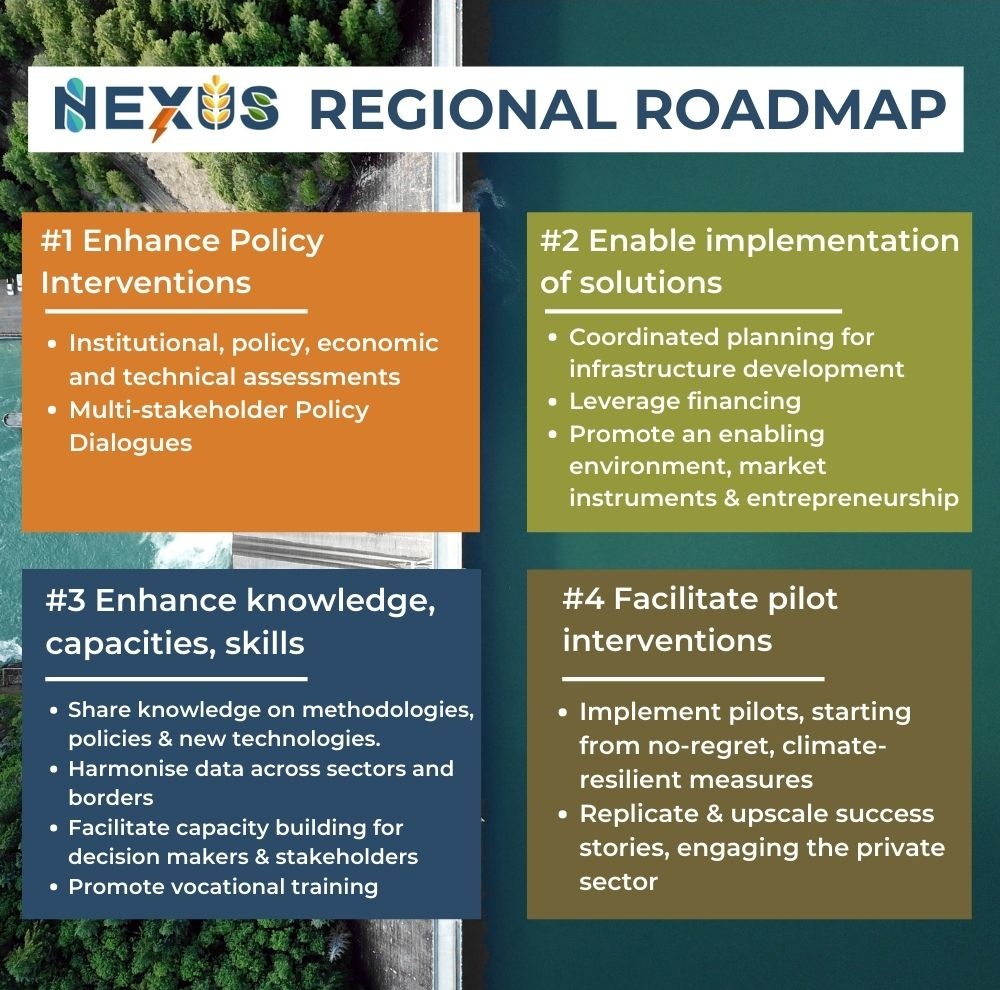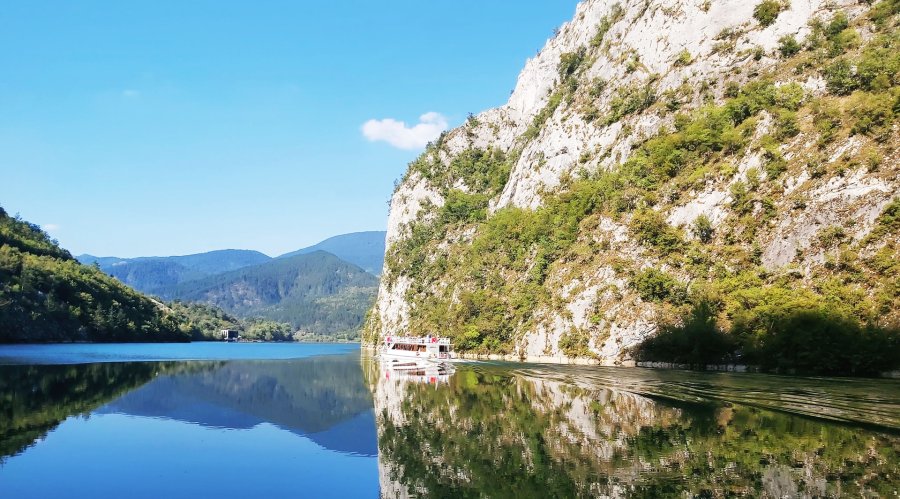Current status of the Nexus in South East Europe
Integrated natural resources management remains a substantial challenge in South East Europe (SEE), despite significant advancements especially in the past decade. Unsustainable and non-integrated management of natural resources has been directly and indirectly affecting economic growth, human prosperity as well as the environment and ecosystems.
The Water-Energy-Food-Ecosystems Nexus approach has been introduced in the natural resources management agenda to facilitate the enhancement of water, energy and food security, while preserving ecosystems and their functions. The Nexus approach provides for an integrated and coordinated approach across sectors, with a view to reconciling potentially conflicting interests as they compete for the same scarce resources, while capturing existing opportunities and exploring emerging ones.
The Nexus approach is especially relevant to SEE given the significant share of hydropower in the region’s energy mix. It is also important in the context of the efforts of the Economies in the Region to transition to a Green Economy and accede to the European Union.
In SEE, existing good practices relevant to a Nexus approach include:
- the establishment of inter-ministerial coordination bodies;
- consultative bodies, for example, on rural development;
- the integration of water and biodiversity targets in agriculture and/or rural development plans;
- Nexus assessments and studies to identify priority synergies and trade-offs.
However, many policy and management areas to better address Nexus dynamics still show significant gaps and potential for improvement. In general, the administrative system established often foresees several authorities sharing the competencies for the specific Nexus sectors, with one ‘line’ authority leading initiatives. Currently, policy development via regulations, strategies or plans is often characterized by:
- formal institutional cooperation, but not necessarily translating into policy integration;
- isolated efforts;
- lack of common targets;
- overlapping responsibilities and competing objectives among local and central governments.
The Regional Nexus Policy Dialogue
A set of activities was developed as part of the Regional Nexus Policy Dialogue, including:
1. Four Regional Nexus Roundtables held back-to-back with meetings of Nexus-related Ministry representatives:
- the 1st Regional Roundtable was held on 20-22 June 2017 in Belgrade, Serbia;
- the 2nd on 23-24 October 2018, in Skopje, North Macedonia (more information and related materials are available here);
- the 3rd on 16-18 October 2019, in Tirana, Albania (more information and related materials are available here).
- the 4th on 26 July 2022, in Tirana, Albania (more information and related materials are available here)
These Roundtables engaged up to 90 stakeholders each, including Ministries and institutions from the Region, as well as of civil society organisations, academia and research, and international organisations, essentially creating a Community of Practice on the Nexus in SEE. They were designed and structured to increase awareness and enhance capacities of participants on the Nexus approach and promote exchange of related knowledge and experience in the Region.
The Meetings of Ministerial representatives provided overall guidance on the development of the Dialogue Process and moreover enabled the advancement of further Nexus action in the SEE, by facilitating the selection of the transboundary basins and the Economy for which Nexus Policy Dialogues and Technical Assessments would be implemented. It also enabled the discussion and approving in principle of, the outline of a Nexus Roadmap for the Region, including the key components-pathways of actions to promote the adoption of the Nexus approach in SEE.
2. A Regional Nexus Mapping Study that:
- identified the level of institutional and policy integration in the water, energy, land and environment sectors in each Economy and at the Regional level;
- identified key inter-linkages and potential synergies and trade-offs;
- provided the background for the discussions during the Roundtables and meetings.
The Study was presented and discussed in the Skopje Roundtable (23-24 October 2018) and subsequently endorsed through a written process without any further comments by members of the RWG-Env. The Study is available here.
Further to the activities above, the SEE Nexus Project, funded by the Austrian Development Cooperation, is implementing a range of further activities.
Looking forward: a Regional Nexus Roadmap for SEE
 Based on the relevant recommendations of the endorsed Regional Nexus Mapping Study; the discussions during the 2nd Regional Nexus Roundtable and Nexus Group Meeting in Skopje in 2018; as well as on the Nexus Workplan of the Union for the Mediterranean (adopted by representatives of all Mediterranean countries), an outline of a Regional Nexus Roadmap for SEE was presented, discussed and endorsed in principle during the 3rd Regional Nexus Roundtable (Tirana, 16-18 October 2019). The outline consists of the following Components and key areas of intervention:
Based on the relevant recommendations of the endorsed Regional Nexus Mapping Study; the discussions during the 2nd Regional Nexus Roundtable and Nexus Group Meeting in Skopje in 2018; as well as on the Nexus Workplan of the Union for the Mediterranean (adopted by representatives of all Mediterranean countries), an outline of a Regional Nexus Roadmap for SEE was presented, discussed and endorsed in principle during the 3rd Regional Nexus Roundtable (Tirana, 16-18 October 2019). The outline consists of the following Components and key areas of intervention:
- Enhance policy interventions and the identification and prioritization of solutions
- Institutional, policy, economic and technical assessments
- Multi-stakeholder Policy Dialogues
- Enable planning and implementation of Nexus solutions and investments
- Coordinated strategic planning for infrastructure development, addressing Nexus considerations
- Leverage and facilitate financing for Nexus interventions
- Promote an enabling environment, market instruments and entrepreneurship relevant to the Nexus approach
- Enhance knowledge, capacities, skills and sharing of experience
- Create and share knowledge on Nexus methodologies and policies as well as on technologies and innovations
- Harmonise data across sectors and borders
- Facilitate capacity building for decision makers, key stakeholders and staff
- Promote vocational training in Nexus-related skills
- Facilitate the design and implementation of pilot interventions with replication/upscaling potential
- Implement pilots, starting from no-regret, climate resilient measures
- Replicate/upscale success stories, also engaging the private sector
Based on the above outline, GWP-Med will prepare a draft Regional Nexus Roadmap with the aim to be discussed in RCC’s Regional Working Group on Environment at its meeting in mid-2020. GWP-Med will also explore funding options for holding a 4th Regional Nexus Roundtable at the end of 2020 (due to the pandemic, the 4th Regional Nexus Roundtable was held on July 2022).
For more information on related activities, see news items below:
• 2nd Regional Nexus Roundtable
• 3rd Regional Nexus Roundtable
• 4th Regional Nexus Roundtable
- The Regional Dialogue is financially supported by:
- The German Ministry for the Environment, Nature Conservation and Nuclear Safety Advisory Assistance Programme (AAP) for environmental protection in the countries of Central and Eastern Europe, the Caucasus and Central Asia and other countries neighbouring the European Union, in the framework of the project “Water-Food-Energy-Environment Nexus Policy Dialogue Process in South East Europe”, supervised by the German Federal Environment Agency (UBA)
- The Global Environment Facility (GEF) through its Programme “International Waters: Learning Exchange and Resources Network (IW:LEARN)”, Activity 2.3: Supporting Regional Cooperation on Shared Water Resources through Dialogue
- The Austrian Development Agency (ADA) in the framework of the project “Promoting the Sustainable Management of Natural Resources in Southeastern Europe, through the use of the Nexus approach” (SEE Nexus Project), implemented by GWP-Med in cooperation with the United Nations Economic Commission for Europe (UNECE).
